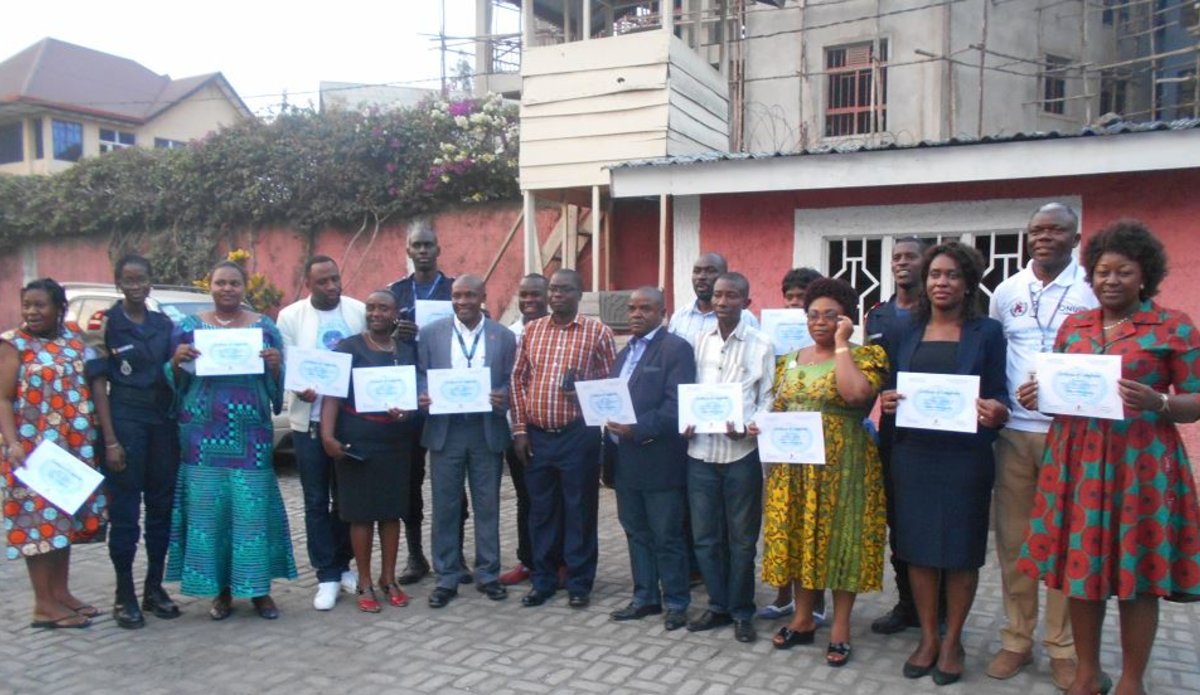MONUSCO Trains HIV Counsellors in Goma
Goma, 17 January, 2017 – In the fight against HIV and AIDS in the Democratic Republic of the Congo (DRC), MONUSCO has been supporting national institutions as well as the initiatives of the United Nations system in its efforts to response to issues of HIV through the innovative programme of activities of its HIV/AIDS Section. This also includes the effort to overcome stigma and discrimination related to AIDS as well as capacity-building of people involved in the fight against HIV.
At the end of a four-day workshop to train HIV Counsellors in the North Kivu Provincial capital, Goma, this initiative was said to have effectively supported individuals and communities that have been suffering the effect of this global epidemic. The training workshop brought together participants from the United Nations agencies represented in the North Kivu Province and was held at the UNFPA premises in Goma, in collaboration with UNAIDS.
According to the officials of the HIV/AIDS Section of MONUSCO, the goal of the training workshop was to build the capacity, increase the awareness and knowledge of participants regarding counselling on HIV and AIDS. It was also meant to build a consensus on how best to approach people living with HIV as well as those who may seek to know their HIV status through the Voluntary Confidential Counselling and Testing (VCCT) programme.
For four straight days, plenary lectures focused on the role of HIV Counsellors and on the reporting procedures. Emphasis was also placed on effective counselling strategies, along with the importance of proper HIV counselling initiative. Facilitators also called the attention of the participants to the importance of having proper counselling facilities that encourage people to seek VCCT services. All participants were then reminded that their role is also very vital in the fight against stigma and discrimination as well as a responsibility to draw out key issues related to the importance of doing early HIV test.
The training workshop ended with a closing plenary and feedback session involving all who helped to organize the workshop. At the close of the event, the Chief of HIV/AIDS Section, Joseph Balironda, who chaired the ceremony, thanked all the participants for accepting to sacrifice their time to attend the workshop. In a keynote remark, he highlighted the importance of the training workshop and said that it was taking place within the framework of the international approach towards HIV and AIDS.
While thanking UNFPA for opening the doors of their premises to host the training, he appreciated the efforts of UNAIDS and thanked them for helping to coordinate the training workshop. He equally used the occasion to stress the need for proper handling of people living with HIV as he encouraged early HIV testing.
“The most important aspect of this training is to empower you as change agent to implement the 90 90 90 campaign”, Balironda reminded his audiences while further explaining that this campaign means 90 percent of individuals must know their HIV status, 90 percent of those who know their HIV status must have access to care and support, and 90 percent of those who are accessing care and support must have their viral loads reduced.
“It is critically important that the skills that you have acquired in the course of this training are put to use because we can have the national and international frameworks, but without you being the change agent it would not be possible to turn the tide”, he continued. “This country is looking at you because you are now the right people to turn the tide. We are also looking at you to make sure that whatever you have been told is actually implemented”, he cautioned.
Presentations were also made by the representative of UNAIDS for the North and South Kivu Provinces who expressed gratitude to MONUSCO for making it possible for the training workshop to hold. He said that the training was very reach in content and urged participants to make good use of the knowledge gained during the four days of training.
The participants agreed that the workshop had positively helped their counselling skills, and many were eager to counsel colleagues in their various organizations. As all were keen to continue collaborating with the HIV/AIDS Section, one of them said that the four-day training helped them to focus on the realities of HIV and AIDS in the DRC and particularly in the North Kivu Province.
“I am very happy and thankful for having participated in this training workshop. We are now ready and capable of counselling people living with HIV”, she says. “As HIV Focal Points in UN Agencies, we are going to do our best to be very active in HIV sensitization activities with the knowledge acquired during this training”.
It is also important to note that MONUSCO is building further on this work by bringing together all HIV Focal Points in UN agencies to deliberate, share initiatives, and give input into the HIV and AIDS policy of the United Nations Organization under the coordination of UNAIDS.
By Joseph Tabung Banah
 UN
UN United Nations Peacekeeping
United Nations Peacekeeping




